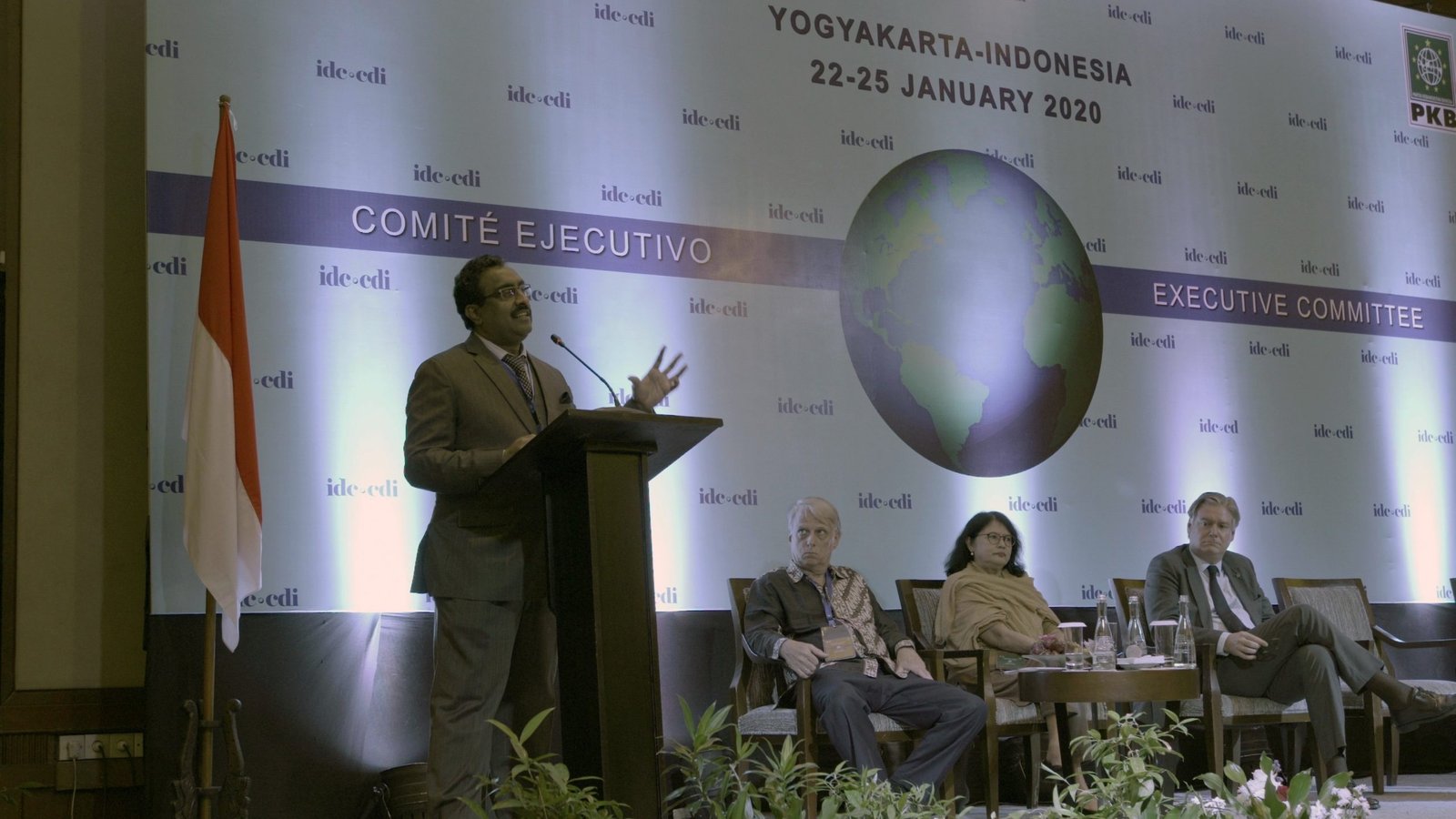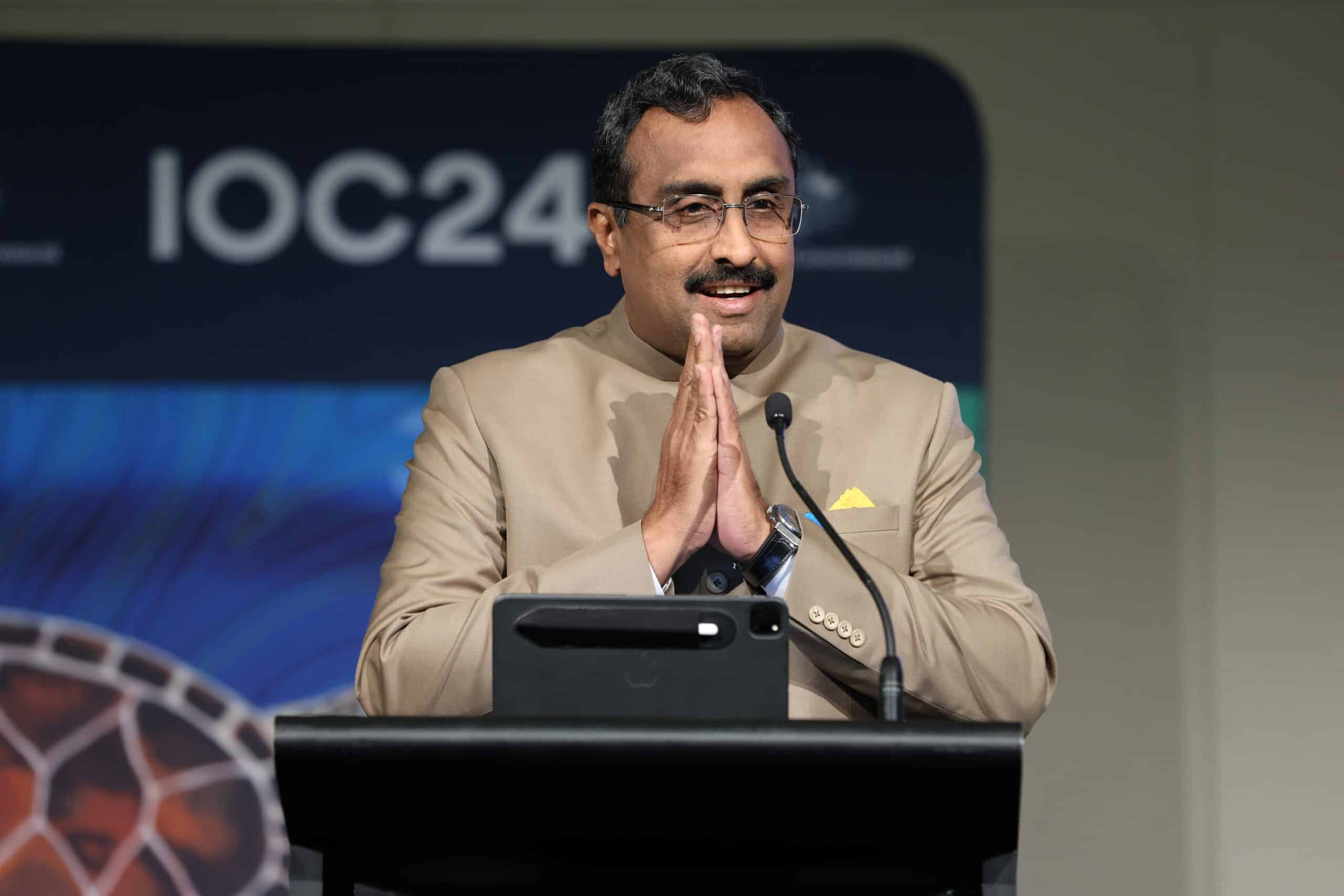
|
Getting your Trinity Audio player ready...
|
Text of Shri Ram Madhav’s Address at the Executive Committee Meeting of the Centrist Democrat International (CDI) in Yogyakarta, Indonesia on January 24, 2020.
Eurasia is largest contiguous landmass on earth. Its history is a witness to the rise of great ancient civilizations like the Greek, Roman, Indian and Chinese. World’s greatest religions like Christianity, Islam, Hinduism and Buddhism took birth in its lap. Eurasia today is home to close to 70% of the world’s population and occupies almost 40% of the world’s geography.
Eurasia is home to most of the world’s great powers today like Russia, China, India, Japan, Indonesia, UK and Germany. Developing such a region into a coherent union through connectivity, commerce, security and cooperation would certainly be a beneficial idea.
Historically this region has been linked through trade and culture. India’s connect with the Greeks – who were called the Yavanas – dates back to pre-Christian era. Megasthanese – the Greek ethnographer (350-290 BC) had visited India and authored a book by name Indica. He was born in Turkey and sent to Pataliputra to be an ambassador of Seleucus 1 to Chandragupta Maurya. For China, it was the ancient Silk Route that had linked it to Europe through trading in silk. For India, it was the Spice Route that had connected it to West Asia, Europe and even Africa. For China, it was largely through land, while for India it was largely through voyages on the seas. India had transmitted not only goods but also ideas and knowledge in the region.
However, it is important to underscore the challenges involved in building an abiding Eurasian alliance. Beyond contiguity of landmass, the region has very little to boast of in terms of coherence and commonness. Europe and Asia have two different civilizational backgrounds and consequently two different historical experiences. Several regional forums like Eurasian Economic Union EAEU and Shanghai Cooperation Organisation SCO have been formed in the region with a view to build an Eurasian coalition. Yet, they have not yet found proper rythm.
It is important to also not miss that part of the history of the region, which is largely known for colonialism of one kind or the other. Pax-Mongoliana to Pax-Sinica was interspersed with European colonialisation of the countries in Asia. In between happened the religious and ideological conflicts from crusades to fascism to communism to cold war. The hangover is still there.
West-East divide in Europe is still a reality in spite of the creation of the European Union and European Parliament. Russia still has its empire and China its ambition. Arab world is plagued by terrorism and internecine conflicts. Unilateral initiatives in the name of trade and development are leading to suspicions about resurgence of neo-colonialism. Talk of 21st century Silk Route and non-existent Maritime Silk Route are further fuelling these suspicions.
It is also a fact that the primetime for Eurasian union has passed. The global power axis has shifted to the Indian Ocean Region in the 21st century. Indo-Pacific has emerged as the new global epicenter for trade, commerce and connectivity. It is here that economies of scale exist; populations with purchasing power exist; energy-guzzler developing nations exisit; defense spending happens. Indian Ocean and Indo-Pacific have emerged as the most happening region in the world today. Interestingly, all the important nations in the Eurasian region have stakes in the Indo-Pacific too. Eurasian unity will probably be achieved through the Indian Ocean region.
Incidentally, unlike in Eurasia, there is a larger coherence and commonness in the Indo-Pacific region. It is a region with ancient cultural and civilizational connections. Countries like India and Indonesia share a lot in common. This region is home to large and functional democracies from Japan to India to Indonesia to Australia. It has thriving religious pluralism, dominated by the spirit of peace, tolerance and coexistence. World’s two largest Muslim populated countries – Indonesia and India – situated in the heart of this region, have shown to the world the peaceful face of Islam by firmly rejecting radicalism, terrorism and exclusivism. In fact, it is time that Indonesia, together with India, takes over the leadership of the Islamic world and guides it through its version of syncretism Islam. A new Non Alignment spirit has to be kindled in our two nations.
Eurasia, due to its sheer size and contiguity, undoubtedly offers a huge opportunity. India has strong ties with many countries in the region. Our development partnership in Afghanistan is significant. Russia and India are important trade partners. We are working on an FTA between India and Eurasia Economic Union led by Russia. India’s ties with EU and its member countries too are strong and robust. India, being the largest and successful democracy in the world and a country wedded to pluralism and secularism, with 1.3 billion strong diverse population professing almost all faiths and religions in the world and coexisting peacefully, is keen to join other like-minded friends in building an open, stable and cooperative Eurasia.
However, the region needs more focused efforts at cooperation and development. Countries in the region have to shed unilateralism and accept the principle of stakeholdership. Nothing should be imposed as a fait accompli on nations in the name of trade or development. We need to come together to curb terrorism. Recognition that terrorism is a global threat and isolation of state and non-state sponsors of it is of utmost importance is the call of the hour for any future arrangement in the region. Attitudes like ‘Your terrorist is my freedom fighter’ or ‘Your terrorist is my strategic partner’ – don’t help.
Terrorism is the greatest challenge to democracies and human values that they cherish. Democracies offer checks and balances in national stability and international cooperation. Eurasia has to travel a distance in this regard too. Eurasia cannot be a platform for expansionist ambitions of any newly powerful nations; but it should be a forum for newly rising powers to cooperate and connect. It should be a win-win arrangement for all.
Until we find a common rhythm based on some of these principles, a larger Eurasian coalition will just remain a pipedream.



